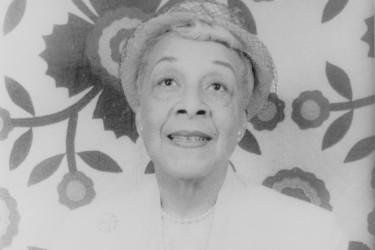
About Open Ears: So many people who made invaluable contributions to classical music were underappreciated in their time, or have been nearly lost to history. That’s why KUSC is starting Open Ears, a series of stories about composers, musicians, and conductors who deserve more recognition. You can learn more and explore other articles here.
If I were to tell you that the Berlin Philharmonic had invited an American journalist to conduct a concert, you’d probably think it was some kind of publicity stunt.
But, here’s the thing: the Berlin Philharmonic did invite an American journalist to conduct a concert and it was way more than a publicity stunt. The concert took place in 1945, four months after the Nazi surrender in World War II. According to Time Magazine, the audience was comprised of approximately 2,000 Berliners and 500 Allied soldiers.
 Photo Courtesy of Carl Van Vechten photograph © Van Vechten Trust / Beinecke Library
Photo Courtesy of Carl Van Vechten photograph © Van Vechten Trust / Beinecke Library
The journalist’s name was Rudolph Dunbar and in reality, he was a musician first and war correspondent second. His guest conducting appearance in 1945 marked the first time a Black man would conduct the Berlin Philharmonic.
Dunbar, the grandson of Black slaves, was born in poverty in the early 1900s–various sources put the year anywhere between 1902 and 1907–in the town of Nabacalis on the northern coast of what was then British Guiana. He started playing clarinet (jazz and classical) with the British Guiana Militia Band at age 14 before moving to New York at 19 to attend the Juilliard School (then the Institute of Musical Art). Dunbar became active in the Harlem jazz scene, joining The Plantation Orchestra. You can hear him on clarinet in this recording.
In New York, Dunbar met composer William Grant Still. The two became close friends and collaborators. Dunbar became a champion of Still’s music. It was Still’s Symphony No. 1 in A-flat Major, Afro-American, that Dunbar conducted in that 1945 concert with the Berlin Philharmonic, which earned Dunbar a huge ovation, including at least five curtain calls.
After graduating Juilliard, Rudolph Dunbar moved to Europe, studying conducting with Felix Weingartner (student of Franz Liszt and successor to Gustav Mahler at the Vienna Philharmonic). In Paris, Dunbar was invited by Claude Debussy’s widow to give a recital in their home. In London, he founded a clarinet school and wrote a Treatise on the Clarinet that achieved worldwide renown. In 1942, Dunbar became the first Black man to conduct the London Philharmonic Orchestra. The concert was a fundraising effort for “Britain’s coloured allies” and the audience at the Royal Albert Hall that night numbered more than 7,000.
 Photo Courtesy of Carl Van Vechten photograph © Van Vechten Trust / Beinecke Library
Photo Courtesy of Carl Van Vechten photograph © Van Vechten Trust / Beinecke Library
Dunbar joined a Black regiment during World War II, took part in the invasion of Normandy, and became the first foreigner (of any race) to conduct an orchestra following the liberation of Paris: the Festival of American Music, featuring the orchestra of the Paris Conservatoire with pianist Jeanne-Marie Darré.
An outspoken activist for racial equality, he said, “I will make my home in Paris where, if you are good, they will applaud you whether you are pink, white or black, and if you are bad they will whistle at you.”
His success as a conductor continued for a time. In addition to the Berlin and London Philharmonics, Dunbar was also the first Black man to conduct in Poland and Russia. He made his U.S. debut at the Hollywood Bowl (the same venue where William Grant Still had become the first Black man to conduct a major American orchestra a few years earlier).
But gradually, the concert appearances for Rudolph Dunbar began to dry up. He attributed this to racism, particularly at the BBC. At his Hollywood Bowl debut, the British press followed Dunbar with great enthusiasm. This prompted Dunbar to scoff, saying, “They want to show these films in the colonies and say, ‘look what we have done for Dunbar,’ but it is not the British who have done this for me, it is the Americans.”
Dunbar died in 1988. To this day, there is still mystery surrounding Dunbar’s blacklisting from concert appearances. Although for Dunbar, it wasn’t mystery, it was racism. You can read more here and also here. And you can watch a brief video interview (in French) with Dunbar here.







